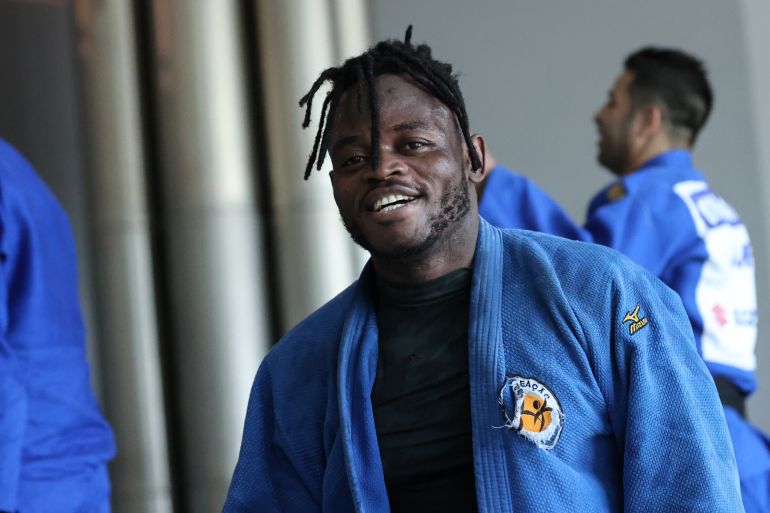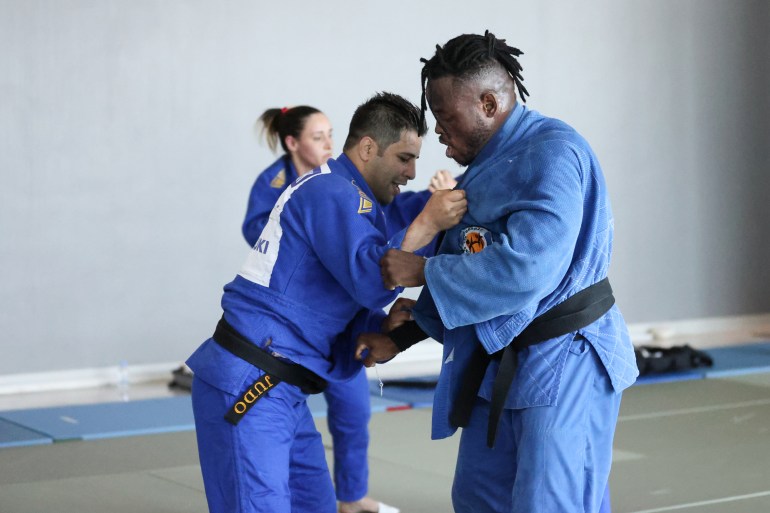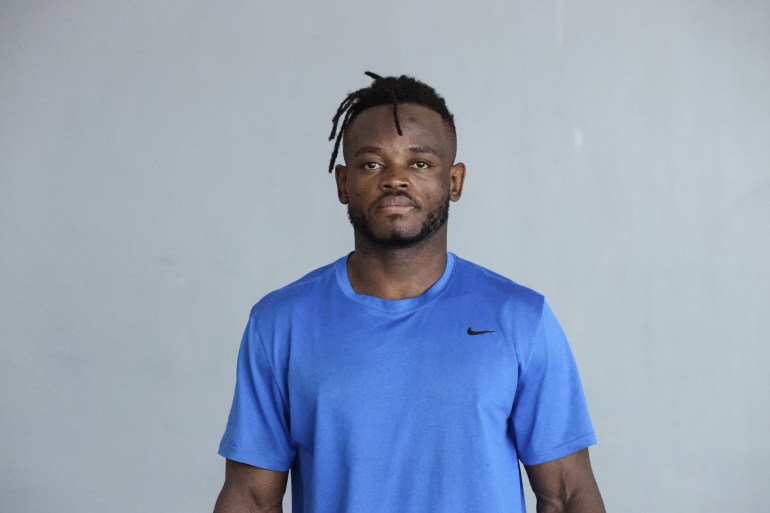Misenga: A DRC refugee hoping to inspire millions at the Olympics
Misenga’s mother was murdered when he was nine. He fled a team camp and stayed back in Brazil. Now, he’s representing the Refugee Olympic Team for the second time.

In 2001, Popole Misenga’s mother was murdered during Democratic Republic of Congo’s civil war.
He was nine at the time. After walking alone for a week, he was finally rescued and brought to Kinshasa where he was first introduced to judo.
Keep reading
list of 4 items‘My Olympics journey should give hope to all young Afghan girls’
How Pakistan hockey went from world-beaters to Olympic absentees
Slowest to qualify, Tunisian Hafnaoui wins Olympic swimming gold
Later this month, Misenga will represent the Refugee Olympic Team for a second time after making his debut in 2016 in Brazil, where he has been living since 2013.
Misenga’s life changed in 2013 when he was in Brazil for the world judo championship.
He fled the DRC team camp without money, passport or food. He said it was his only chance and opportunity to escape after he was mistreated by his coaches and the abuse he experienced for not winning medals.
Surviving the civil war in DRC and living a challenging life in Brazil, Misenga says he never forgot his dreams and just wants to show the world that anything is possible.
Al Jazeera spoke to the judoka about life in Brazil, how judo has helped him physically and mentally and how he stands so close to seeing his dream come true.
Judoka Popole Misenga will represent refugees at the Olympics once more and this time as a father. He is hoping to inspire refugees around the world to follow their dreams just like him. 🥋#RefugeeOlympicTeam #StrongerTogether #Hope #Tokyo2020 #OlympicRefuge@refugees pic.twitter.com/A9G1F5i4w5
— Refugee Olympic Team (@RefugeesOlympic) July 4, 2021
Al Jazeera: You have not been back to DRC since 2013. What is it that you miss most about your country?
Misenga: I only miss my brother. We normally talk on the phone but we have not met since 2013.
Al Jazeera: You escaped from the team camp in 2013. How difficult was that decision and, looking back, you think it was the right one?
Misenga: I didn’t decide to stay in Brazil, it just happened. At that moment, the pressure of the coaches in the national squad was so high. They were not treating us well, they didn’t care about us, everything was bad and they never stopped.
We were hungry. We had no money. They didn’t pay us. Once, I went three days without eating and I couldn’t stand that situation any more. In DRC, the situation was the same. I didn’t have a place to sleep, I didn’t have a house or a family. So I just decided that since I did not have anything to lose, I can stay here in Brazil and start a new life.
It was the right decision. Today, I have a wife and children who I love. I never imagined I could become a father.
Al Jazeera: What was the experience of living in a Rio favela?
Misenga: It was not easy. I left my country in the middle of the war and when I got here I was living inside another war. These wars were happening all the time with a lot of confusion and gunshots everywhere. Innocent people were also being killed. People would barge into my house to shelter from stray bullets. Even then, I decided to stay.
I ran from a system of heavy abuse to stay in a country all alone. I spent some time sleeping on the streets of Rio, skipping meals till I found shelter in the north of the city where there was a small Congolese community.
I lived there for a few years, surviving on informal jobs.
Now, I want to have a chance to leave Brazil one day and give my children the opportunity to study abroad and give them a good path in life and a better future.

Al Jazeera: When did you start training in Brazil?
Misenga: I started training at Reacao Institute, an NGO founded by the former athlete Flavio Canto. At this centre, I also got help from co-founder and veteran Olympic coach Geraldo Bernardes, who coached the Brazilian national judo team.
That is when I started dreaming about being at the Olympics.
Al Jazeera: How has your life changed since you took part in your first Olympics in 2016?
Misenga: Everything has changed. Fortunately, I had financial support from the International Olympic Committee and International Judo Federation until I managed to get out of the favela where I was living before. Now, I live in a safe place where I don’t hear gunshots all the time.
There were some days when I couldn’t reach or leave my house because of gang wars. I hadn’t got used to it but I couldn’t leave either because I couldn’t afford to do that then.
Al Jazeera: How has the experience of being part of the Refugee Olympic Team been?
Misenga: We, refugees, have dreams, just like everybody else. We dream to be someone, to do something we like and we can never give up. I am an example of many refugees that are now able to go to school. I have managed to work on my dream and I would like to remind millions of refugees around the world to dream more and make things happen.
Al Jazeera: What are your expectations at Tokyo 2020? How did you prepare for it and what were the challenges?
Misenga: The biggest challenge was the coronavirus pandemic. I took a lot of care, keeping my hands clean all the time, washing them with alcohol gel, wearing masks and during lockdowns when I could not train with my colleagues, I trained alone at home. It is something happening not only with me but everyone across the world.
For me, I just want to reach my dream of competing and winning a medal. This is where my mind is: Win a medal for our team.
Al Jazeera: Your story has inspired many people around the world. How does that make you feel and what is your message for millions of refugees around the world?
Misenga: My message is simple. Never let your dreams die. Make sure you pursue them. I dream a lot about winning a medal for my team and have more beautiful stories to tell for the millions of refugees around the world. Now I stand very close to that.
This interview has been edited for clarity and length.
